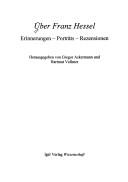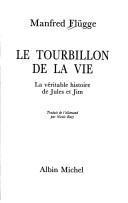| Listing 1 - 7 of 7 |
Sort by
|

ISBN: 3896211285 Year: 2001 Publisher: Oldenburg Igel
Abstract | Keywords | Export | Availability | Bookmark
 Loading...
Loading...Choose an application
- Reference Manager
- EndNote
- RefWorks (Direct export to RefWorks)
Book
ISBN: 3926433183 Year: 1998 Publisher: Berlin
Abstract | Keywords | Export | Availability | Bookmark
 Loading...
Loading...Choose an application
- Reference Manager
- EndNote
- RefWorks (Direct export to RefWorks)
Article
Abstract | Keywords | Export | Availability | Bookmark
 Loading...
Loading...Choose an application
- Reference Manager
- EndNote
- RefWorks (Direct export to RefWorks)
Book
ISBN: 3927104620 Year: 1994 Volume: 3 25 Publisher: Paderborn : Igel Verlag Wissenschaft,
Abstract | Keywords | Export | Availability | Bookmark
 Loading...
Loading...Choose an application
- Reference Manager
- EndNote
- RefWorks (Direct export to RefWorks)
Hessel, Franz --- Cities and towns in literature. --- City and town life in literature. --- Flaneurs --- Villes dans la littérature --- Vie urbaine dans la littérature --- Flâneurs --- Hessel, Franz, --- Criticism and interpretation. --- Villes dans la littérature --- Vie urbaine dans la littérature --- Flâneurs

ISBN: 2226074759 Year: 1994 Publisher: Paris : Albin Michel,
Abstract | Keywords | Export | Availability | Bookmark
 Loading...
Loading...Choose an application
- Reference Manager
- EndNote
- RefWorks (Direct export to RefWorks)
Authors, German --- Authors, French --- Ecrivains allemands --- Ecrivains français --- Biographies --- Biographies --- Hessel, Helen, --- Roché, Henri Pierre, --- Roché, Henri Pierre, --- Hessel, Franz, --- Friends and associates. --- Biography --- Exile --- Jules et Jim (Motion picture)
Book
ISBN: 335102228X Year: 1993 Publisher: Berlin : Aufbau-Verlag,
Abstract | Keywords | Export | Availability | Bookmark
 Loading...
Loading...Choose an application
- Reference Manager
- EndNote
- RefWorks (Direct export to RefWorks)
Authors, French --- Authors, German --- Ecrivains français --- Ecrivains allemands --- Biographies --- Biographies --- Roché, Henri Pierre, --- Roché, Henri Pierre, --- Hessel, Franz, --- Hessel, Helen, --- Friends and associates. --- Exile --- Jules et Jim (Motion picture)
Book
Year: 2012 Publisher: Princeton (NJ) : Princeton University Press,
Abstract | Keywords | Export | Availability | Bookmark
 Loading...
Loading...Choose an application
- Reference Manager
- EndNote
- RefWorks (Direct export to RefWorks)
Anke Gleber examines one of the most intriguing and characteristic figures of European urban modernity: the observing city stroller, or flaneur. In an age transformed by industrialism, the flaneur drifted through city streets, inspired and repelled by the surrounding scenes of splendor and squalor. Gleber examines this often elusive figure in the particular contexts of Weimar Germany and the intellectual sphere of Walter Benjamin, with whom the concept of flanerie is often associated. She sketches the European influences that produced the German flaneur and establishes the figure as a pervasive presence in Weimar culture, as well as a profound influence on modern perceptions of public space. The book begins by exploring the theory of literary flanerie and the technological changes--street lighting, public transportation, and the emergence of film--that gave a new status to the activities of seeing and walking in the modern city. Gleber then assesses the place of flanerie in works by Benjamin, Siegfried Kracauer, and other representatives of Weimar literature, arts, and theory. She draws particular attention to the works of Franz Hessel, a Berlin flaneur who argued that flanerie is a "reading" of the city that perceives passersby, streets, and fleeting impressions as the transitory signs of modernity. Gleber also examines connections between flanerie and Weimar film, and discusses female flanerie as a means of asserting female subjectivity in the public realm. The book is a deeply original and searching reassessment of the complex intersections among modernity, vision, and public space.
Arts, Modern --- Modernism. --- Modernizem. --- Literary theory. --- Literarna teorija. --- Film. --- Theory of arts. --- Teorija umetnosti. --- Arts and literature. --- Umetnost in književnost. --- Arts, German --- Flaneurs in literature. --- Flaneurs in art. --- Germany. --- Nemčija. --- Aragon, Louis. --- Augenblick. --- Benjamin, Walter. --- Berlin. --- Bildung. --- Denkbild. --- Goll, Yvan. --- Hake, Sabine. --- Hessel, Franz. --- Jünger, Ernst. --- Koch, Gertrud. --- Kracauer, Siegfried. --- Kurfürstendamm. --- Landwehrkanal. --- Lichtspiele. --- Lumière brothers. --- Munich. --- National Socialism. --- New Subjectivity. --- New Woman. --- advertising. --- boredom. --- camera. --- capitalism. --- cinema. --- commodity. --- dandy. --- detective. --- eroticism. --- fashion. --- feuilleton. --- film theory. --- historian. --- industrialization. --- melancholy. --- modernity. --- photography. --- psychoanalysis. --- railroads. --- scopophilia. --- semiotics. --- spectator. --- tourism.
| Listing 1 - 7 of 7 |
Sort by
|

 Search
Search Feedback
Feedback About
About Help
Help News
News